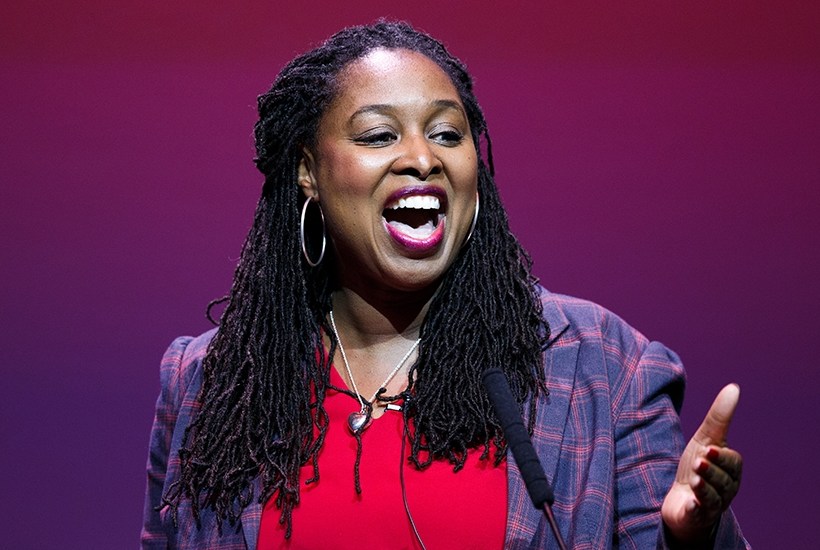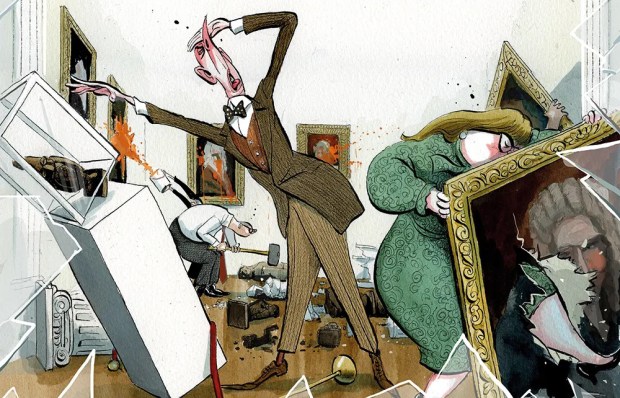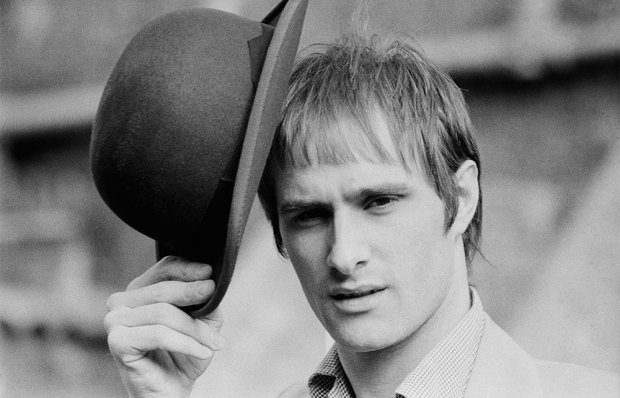Hearing that Dawn Butler MP had been pulled over by the Metropolitan police, I briefly hoped the taxpayer might get back the whirlpool bath she charged us on her parliamentary expenses. But the officers skipped the boot and went straight to the passenger side, where they found the member for Brent Central recording them with her phone and looking pleased as punch to audition as the new Rosa Parks.
As it happens, the footage she released showed the police being deeply polite, and they subsequently explained that the pull-over had been due to a registration-plate mix-up. But Butler claimed it was a case of the dreaded ‘stop-and-search’ and within hours she was on Channel 4 News, being grilled by one of their crack interviewers.
Fatima Manji asked Butler how such a thing could happen to someone who a day earlier had been ‘declared one of the 25 most inspirational women in Britain’ by Vogue magazine. The questions on Channel 4 News seem to have got easier since I last went on. A smiling Butler explained that this was all par for the course for an ‘African-Caribbean woman’. She then claimed that the Met Police is ‘institutionally racist’ and that Cressida Dick ‘should spend all of her waking moments trying to eradicate institutionally [sic] racism from the Met Police’.
A day earlier, a black teenager had been macheted to death in broad daylight in front of shoppers on London’s Oxford Street. Three men aged 18 were arrested after arriving at hospital with stab wounds of their own. What normally happens at this stage is that politicians and pundits debate the utility of stop-and-search. Some people say that stop-and-search saves young black lives. Others — like Dawn Butler — declare that stop-and-search is racist because it disproportionately targets people of the racial background who disproportionately do the stabbing. Then the stabbing continues.
I don’t mind admitting that I am growing tired of all the allegations. When Butler tagged the Met Police as ‘institutionally racist’, I noticed myself for the first time vaguely shrugging — not because actual racism isn’t a horrible and ugly thing, but because the currency appears to have been inflated out of use. Over recent months absolutely every-thing has been declared racist: our entire history, our whole society and every white person in it. So allegations about the Met have lost the piquancy they once had.
Meanwhile news of just how racist and awful the UK is appears not to have spread across the Channel. Between Thursday and Sunday, 700 illegal migrants arrived in the UK by boat, largely courtesy of the UK Border Force. The authorities help the people-smuggling networks by meeting the migrants a little way out in the Channel, assisting them off their flimsy vessels, and depositing them safely on British soil, where they can recover from the ordeal that is France.
Like the debate over stop-and-search, the discussion of what to do about law-breaking on this scale is hobbled at the start. Because unless you say ‘let in these tired and huddled masses’ then you will be accused of racism. Ponder out loud whether everyone from the developing world who wishes to move to the developed world is absolutely the same as a Jew fleeing Nazi Germany, and you will be accused of this same appalling vice.
As it happens, a certain amount of vice, or at least vice-signalling, is good for stopping illegal migration. When faced with a surge in illegal migration earlier this decade, the Australian government let it be known that anyone trying to break into the country would see their boat repelled and spend months on a lonely island. While the international media decried this decision, attempts to break into Australia dried up. Similarly, in 2016 the Danish parliament voted in a law that made it possible to take valuables from an illegal migrant up to the amount that their stay would cost the Danish taxpayer. There were howls from the foreign media, and while I don’t know of even one case where the law was enacted, it proved very helpful in sending a message.
In recent days some Tories who wanted to sound tough have talked of sending in the Royal Navy. But on current performance that will simply allow more British vessels to pick up more migrants. Of the thousands who have broken into Britain already this year, all are put up in hotels and other accommodation at taxpayers’ expense and no one — not one — has been returned.
Of course, at this stage people tend to bow to the magisterium of the law. But immigration law has become a charade. By law none of the recent arrivals should be here. According to the Dublin Regulation, genuine asylum seekers ought to have claimed asylum in the first safe country they entered. By rights every arrival should be returned to France, who should return them to Italy (or whichever country they came in from), who should return them to the country in which they started.
None of which happens. It is a pretence, happily nodded along to by people who think they can afford it. We have an asylum system which the British public actually support, but we also now have this strange, bonus system where so long as you complete the assault course and make it to Kent (or the sea near it) then you’re in.
The only way to stop the crossings would be to let it be known that everyone who tries to enter this country illegally will be returned, having risked their lives and wasted their savings. But no politician will suggest it, for the same reason that they fear discussing stop-and-search and other policies. Because to do so risks accusations of racism from insincere actors.
Personally, I start to feel myself getting past all this. When everything has become ‘racist’ then nothing is, and the government should ignore the critics and just do whatever will stop the law-breaking, on land or sea.
Got something to add? Join the discussion and comment below.
Get 10 issues for just $10
Subscribe to The Spectator Australia today for the next 10 magazine issues, plus full online access, for just $10.
You might disagree with half of it, but you’ll enjoy reading all of it. Try your first month for free, then just $2 a week for the remainder of your first year.















Comments
Don't miss out
Join the conversation with other Spectator Australia readers. Subscribe to leave a comment.
SUBSCRIBEAlready a subscriber? Log in